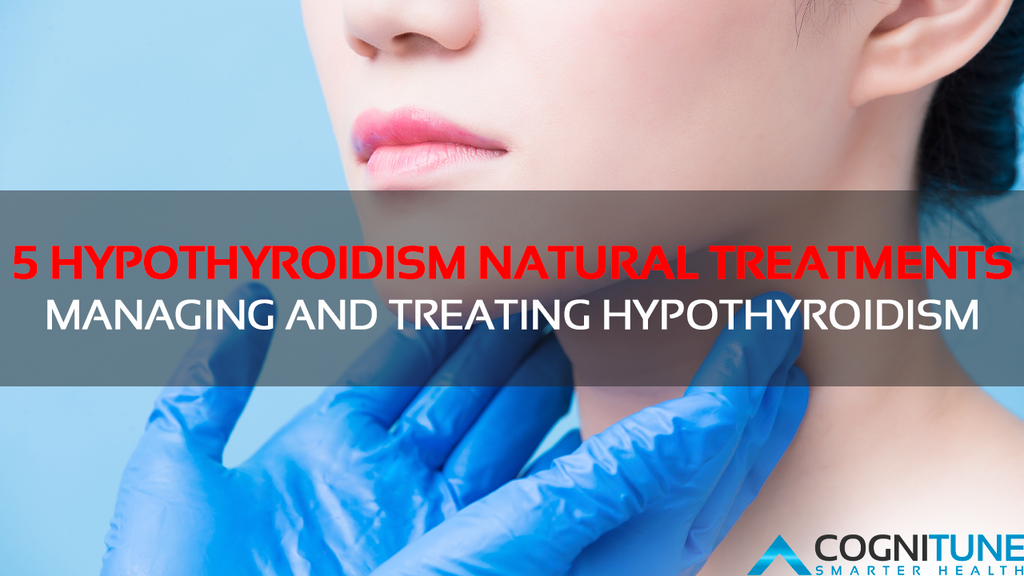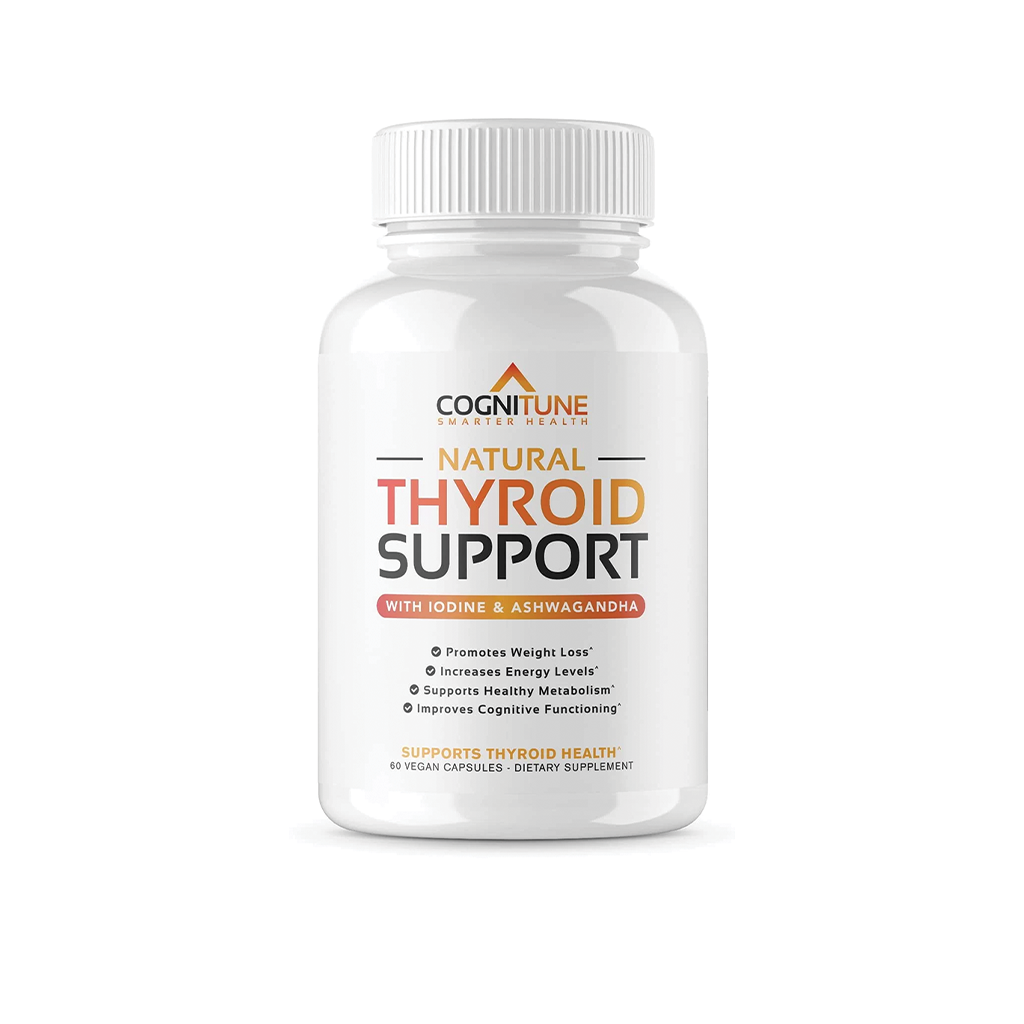5 Hypothyroidism Natural Treatments – Managing and Treating Hypothyroidism

The normal treatment for hypothyroidism is to take a daily thyroid hormone replacement medication. But medications can come with unwanted side effects, and if you forget to take the medicine, it can often lead to more symptoms.
There are some cases where a hypothyroidism natural treatment plan is the better option because there are fewer side effects, and it can fit into your lifestyle better. So, let’s take a look at some of those hypothyroidism natural treatment plans that you can use to manage and treat your hypothyroidism.
Hypothyroidism Natural Treatment
The main goal of natural remedies is often to fix the root of the problem, in this case, the cause of your thyroid problem. A thyroid issue typically starts as the result of:
- Your body missing important nutrients
- Stress
- Poor diet
You can change your diet and start taking herbal supplements to help combat your thyroid issue. These two options tend to have fewer side effects than taking hypothyroidism medication.
Additionally, taking an herbal supplement to deal with a low thyroid function or an underactive thyroid can be beneficial for those who aren’t responding well to the medications provided for the condition.
If you want to avoid taking thyroid medication for your hypothyroidism, consider these five hypothyroidism natural treatment plans.
Selenium
The National Institute of Health (NIH) says that selenium is an element that plays a small part in your thyroid hormone metabolism. Several foods contain selenium, including:
- Grass-fed beef
- Brazil nuts
- Turkey
- Tuna
Hashimoto’s thyroiditis, which is an immune system attack on your thyroid, typically causes a reduction in the selenium supply in your body. By supplementing this element, you could see a balance in your thyroxine or T4 levels.
Before you try supplementing selenium for your hypothyroidism, make sure to consult a doctor about how much of the element you need because every person is different.
Sugar-Free Diet
Processed foods and sugar can lead to your body, having increased inflammation. This inflammation can slow the conversion of T4 to T3, or triiodothyronine, which is another thyroid hormone. The slowdown of this process can make your thyroid disease and symptoms worsen over time.
Additionally, sugar will only boost your energy level for a short amount of time. By eliminating it from your diet, you might find that your energy levels are better regulated, and you might also find that your skin and stress levels are better.
It isn’t easy to adopt a sugar-free diet, but the overall benefit of your hypothyroidism can be worth it in the long run.
Vitamin B
By taking certain vitamin supplements, you can affect the health of your thyroid. Having low thyroid hormone levels can take a toll on the B-12 levels in your body. By taking a B-12 supplement, you can help your body repair some of the damage done by hypothyroidism.
The B-12 vitamin also helps with tiredness, which is a symptom of thyroid disease. Hypothyroidism can also affect the B-1 levels in your body as well.
To add more B vitamins to your diet, try adding more of these foods into your diet:
- Eggs
- Milk
- Cheese
- Tuna
- Sesame seeds
- Asparagus
- Peas and beans
B-12 vitamins are typically safe for healthy individuals when taken at recommended levels. But you should always consult your doctor to see how big of a dosage of B-12 vitamins you should be taking.
Probiotics
The NIH has done studies on the link between small intestine problems and hypothyroidism. It’s been found that altered gastrointestinal motility that’s commonly seen when someone has hypothyroidism causes small intestinal bacterial overgrowth (SIBO), which can lead to chronic gastrointestinal symptoms, for example, diarrhea.
Probiotic supplements that contain helpful live bacteria that help keep your intestines and stomach healthy. Besides taking supplements, fermented drinks, and food, such as yogurt, some cheeses, kombucha, and kefir, all contain helpful probiotics.
Something that needs to be noted is that the Food and Drug Administration hasn’t yet approved the use of probiotics as a hypothyroidism natural treatment, or for any condition. So, before you start taking probiotic supplements, you should talk with your doctor to see if they’ll help you or cause more harm.
Gluten-Free Diet
Taking on a gluten-free lifestyle is more than just a fad for some people who deal with hypothyroidism. The National Foundation for Celiac Awareness has found that there is a significant number of people who have hypothyroidism also deal with celiac disease.
Celiac disease is a disorder of the digestive system where gluten triggers an immune response in the small intestines.
The downside to this is that there hasn’t been much research done yet that supports the claim that a gluten-free diet can be a hypothyroidism natural treatment. However, many people that have hypothyroidism and Hashimoto’s thyroiditis have found that they do feel much better after removing wheat and other gluten-filled foods from their meal plans.
Additionally, you need to be careful when adopting a gluten-free lifestyle because some gluten-free foods aren’t healthy. Some of the gluten-free foods can have a much higher fat content with less fiber than foods containing wheat.
Best Hypothyroidism Natural Supplements
If you want to find a supplement that’s made to help support your thyroid gland by rejuvenating your thyroid’s health and by stabilizing your body’s hormonal environment, then check out CogniTune’s Natural Thyroid Support supplement.
The formula for these natural supplements includes iodine, vitamin B12, magnesium, selenium, and ashwagandha. All of these elements help support your thyroid to help with hypothyroidism and to prevent it.
With these supplements, you’ll also get the advantages of extra energy, a better metabolism, which can lead to weight loss, and better focus.
Takeaway
For many people who have hypothyroidism, taking prescribed medication isn’t working, so they’re on the hunt for hypothyroidism natural treatment plans. You’ll find that with any of the hypothyroidism natural treatment plans, the benefits tend to outweigh the disadvantages.
That’s why for many people adopting a hypothyroidism natural treatment plan is the best option. However, if you’ve had surgery to remove your thyroid, you should avoid a hypothyroidism natural treatment plan.

